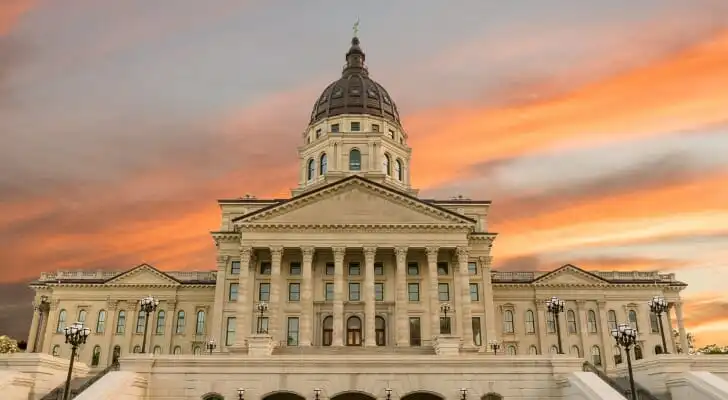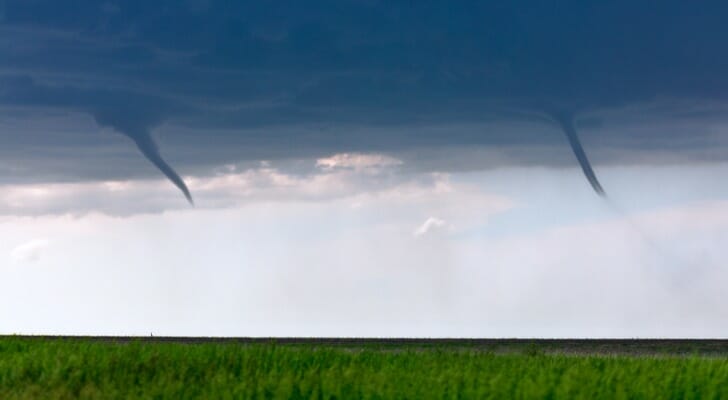 Kansas hasn’t been hit as badly by COVID-19 as states like New York and California, but the pandemic has still affected the Sunflower State. As of mid-May, there were 7,468 reported cases and 164 deaths. On March 28, Gov. Laura Kelly announced a stay-at-home order. In the first week of April, more than 50,000 people in Kansas had filed for unemployment, out of an estimated civilian workforce of just under 2 million. However, there’s assistance avialable from both the federal government and the state of Kansas for residents and small business owners. If coronavirus has affected you or your business, this guide will show you how to find help.
Kansas hasn’t been hit as badly by COVID-19 as states like New York and California, but the pandemic has still affected the Sunflower State. As of mid-May, there were 7,468 reported cases and 164 deaths. On March 28, Gov. Laura Kelly announced a stay-at-home order. In the first week of April, more than 50,000 people in Kansas had filed for unemployment, out of an estimated civilian workforce of just under 2 million. However, there’s assistance avialable from both the federal government and the state of Kansas for residents and small business owners. If coronavirus has affected you or your business, this guide will show you how to find help.
Kansas Coronavirus Relief for Individuals
Kansas already offered assistance for low-income individuals through the Department for Children and Families. Resources that you can apply for include The Emergency Food Assistance Program (TEFAP), Supplemental Food Assistance Program (SNAP), Temporary Assistance for Needy Families (TANF), and Child Care Assistance, which has been expanded to provide additional resources for “essential” workers. The governor also temporarily prohibited evictions and foreclosures, as well as utility and internet disconnects.
The Hero Relief Program expands the existing child care assistance subsidies available through the Department for Children and Families. Beginning April 20, 2020, child care subsidies became available to essential workers who financially qualify. Essential workers include healthcare workers, first responders and other public safety workers, food and agriculture workers, judicial branch essential workers, child and adult protective service specialists, the National Guard, and child care providers caring for children of any qualifying essential workers.
In order to financially qualify, families must have a countable income at or below 250% of the federal poverty level. A family of two making a gross income of $3,591 or less per month, or a family of four making $5,458 or less per month would qualify for this subsidy.
The program also supports child care providers by also offering stipends and grants that can help workers during the pandemic. You can get more information and instructions on how to apply here.
In mid-May, the state announced that 58 property and casualty insurance companies were providing rebates on premiums paid, discounts on rates or credits toward future payments, totaling $56 million. If consumers need help getting contact information for their auto insurer, they can contact the Kansas Insurance Department’s Consumer Assistance Division at 1-800-432-2484 or KID.Commissioner@ks.gov.
Kansas Coronavirus Relief for Small Businesses
 Kansas offers a variety of resources for employers that are affected by coronavirus, such as the Shared Work Program, which allows employers to reduce some or all employees normal weekly work hours by 20% to 40%. To participate, normal weekly work hours for employees must be reduced by 20% (no more than 40%) and apply to at least 10% of employees.
Kansas offers a variety of resources for employers that are affected by coronavirus, such as the Shared Work Program, which allows employers to reduce some or all employees normal weekly work hours by 20% to 40%. To participate, normal weekly work hours for employees must be reduced by 20% (no more than 40%) and apply to at least 10% of employees.
Spreadsheet Filing for Unemployment Insurance
If employers are forced to temporarily lay off employees due to coronavirus, they can file applications for unemployment benefits on behalf of their employees. If you use this option, you can receive one listing of all unemployment claims filed. You will also have the ability to communicate directly with the employer relations administrator instead of waiting to speak with a representative at the Unemployment Contact Center. You can learn more and begin the application process here.
Hospitality Industry Relief Emergency Fund
Gov. Kelly allocated $5 million to the Hospitality Industry Relief Emergency Fund, also known as the HIRE fund. It was quickly spoken for and the fund ran out of money in April. However, the state continues to take applications against the possibility that more money will become available. You can learn more here.
Under the HIRE program, eligible hospitality businesses were able to apply for a one-time loan of up to $20,000. Loans had 0% interest for three years, and no payments were due for the first four months. The funding could be put towards loan or lease payments, utility bills, payroll, accounts payable and inventory.
Hospitality businesses include bars, restaurants, lodging facilities, and conference and event centers. Eligible businesses must be existing for-profit businesses in Kansas, have a workforce of fewer than 100 employees, have no outstanding state tax obligations, and be willing to submit a personal guarantee of repayment from the owners of the business.
Manhattan City Commission Disaster Assistance Fund
The Manhattan City Commission approved a $500,000 disaster assistance fund for local businesses. Under this program, a loan can be up to $5,000, or up to $10,000 for businesses that are ineligible for SBA disaster relief, the Kansas HIRE program or any other state or federal program created to assist business during the 2020 coronavirus pandemic. The loan can be up to $20,000 for primary employers defined as businesses that export over 75% of its product or service outside of the city of Manhattan that have maintained at least 80% of its employees from the fourth quarter of 2019 to March 31, 2020, and maintain employment levels for 12 months after receiving the money.
Businesses must demonstrate that the need is directly due to the impact of COVID-19, and must apply for at least one federal or state program that provides assistance, or receive a letter from a qualified lending institution outlining a longer-term funding strategy. The loan can be used for business stabilization expenses like payroll, working capital, required debt payments, rent or lease payments, marketing, and setting up e-commerce platforms and inventory. You can apply here, although the Manhattan Department of Commerce requests that you read this overview before applying.
Federal Coronavirus Relief for Individuals
The CARES Act, a $2 trillion coronavirus stimulus package, includes several major relief programs for individuals affected by the coronavirus. The bill includes includes coronavirus student relief programs, a tax deadline extension, and paid coronavirus sick leave.
There are enhanced unemployment benefits available if you lose your job because of coronavirus. The three key unemployment relief programs the CARES Act introduced were: Pandemic Unemployment Compensation (PUC), Pandemic Unemployment Assistance (PUA) and Pandemic Emergency Unemployment Compensation (PEUC). This unemployment benefits expansion allows you to claim an additional 13 weeks of unemployment benefits (pushing the total to 39 for most states). This expanded unemployment relief also allows freelancers to claim unemployment if their income has been affected by the crisis.
The CARES Act also established a direct stimulus check program. The stimulus checks are sent directly to all Americans within certain income levels, even if their income has not ben directly affected by the virus. Individuals can receive up to $1,200, while married couples can earn up to $2,400 (plus $500 per dependent). However, the amount you get is determined by your adjusted gross income (AGI). Specifically, individuals won’t receive anything if they make $99,000 or more. The cut-off limit for married couples is $198,000, and it’s $136,500 for heads of household. SmartAsset’s coronavirus stimulus check calculator can help you determine how much you may receive in your stimulus check.
Federal Coronavirus Relief for Small Businesses
 Small businesses impacted by coronavirus can also qualify for federal aid. The CARES Act created relief programs for small businesses, including the Paycheck Protection Program (PPP), which was created to help small businesses rebuild revenue. PPP allows qualifying businesses with fewer than 500 employees to borrow 2.5 times its average monthly payroll costs or up to $10 million (excluding salaries that are $100,000 or more.) Small business owners can apply through a local PPP lender.
Small businesses impacted by coronavirus can also qualify for federal aid. The CARES Act created relief programs for small businesses, including the Paycheck Protection Program (PPP), which was created to help small businesses rebuild revenue. PPP allows qualifying businesses with fewer than 500 employees to borrow 2.5 times its average monthly payroll costs or up to $10 million (excluding salaries that are $100,000 or more.) Small business owners can apply through a local PPP lender.
Another option for small businesses are Economic Injury Disaster Loans (EIDL), which are Small Business Administration (SBA). These SBA loans offer eligible businesses an emergency cash advance of $10,000, with loans of up to $2 million for businesses and non-profits. The application can be found here. Other types of widely accessible coronavirus relief for businesses are the the SBA 7(a) loan program and the SBA Debt Relief Program.
The Bottom Line
Although all initial funds available through the HIRE Fund have been allocated, the state of Kansas is still keeping the form open and collecting information from Kansas hospitality businesses on losses they are facing. In addition, Kansas is offering resources for individuals, such as the Hero Relief Program, and help is also available from the federal government for both individuals and small businesses. Look into the available programs and see what the best options for you might be.
Tips for Managing your Finances
- Consider talking to a financial advisor about putting together a financial plan that can sustain you through a rough economy. Finding the right financial advisor who fits your needs doesn’t have to be hard. SmartAsset’s free tool matches you with financial advisors in your area in five minutes. If you’re ready to be matched with local advisors who will help you achieve your financial goals, get started now.
- The government is offering various types of financial aid to those affected by the pandemic. One is providing stimulus checks. If you’re struggling to meet your rent or mortgage payments, check out coronavirus rent and mortgage relief.
Photo credit: ©iStock.com/pabradyphoto, ©iStock.com/mdesigner125, ©iStock.com/tomofbluesprings